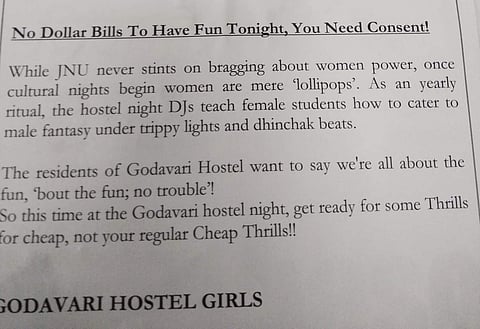

A group of women students of the Jawaharlal Nehru University (JNU) have launched a campaign called ‘Dekho magar consent se’, to ban “sexist” and “objectionable” songs during cultural events on campus. The campaign, started by the residents of the university’s Godavari hostel is firmly against the objectionable songs that were played at their "hostel night" parties organised by the Hostel Committee. "We just had our hostel night on March 31. We told the DJ not to play songs like Lollipop Lagelu and Jeans Dhila Kara. We have appointed people to be in charge of taking care of what songs are being played," said Abhiruchi Ranjan, a final-year PhD student at the university’s Centre for Political Science and a resident of the hostel.
"We have hostel-based events every year. Cultural nights are where students perform — they sing, dance, recite poetry etc. Hostel nights are where we have a special spread and DJ night. We are urging all hostels to follow this for their hostel and cultural nights through a poster awareness campaign," she added. The university has a total of 18 hostels on campus. Each of which organise an annual party between February and April. The students have put up posters on campus with their message, which read, “As a yearly ritual, the hostel night DJs teach female students how to cater to male fantasies.”
The men's hostels have also been urged to follow the same code. "The general response is positive. But some negativity is there as usual. I heard that some guy said, 'Hum toh ladkiyon ko Honey Singh ke gano pe hi nachwaenge.' (We will make girls dance to Honey Singh's songs) That is just sad and unnecessary," Abhiruchi said.
The students don't want the administration to be involved because they feel that they (students) should come up with their own ethical code. "Or this might turn into moral policing at some point. This is about sexist songs and not all music that is sex-positive. I hope that point comes through in the poster," added Abhiruchi.
